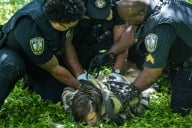You have /5 articles left.
Sign up for a free account or log in.
I’m attending the New England Commission of Higher Education (our regional accrediting body) annual meeting for the first time in a few years, and I’ll be sharing updates from the meeting over the next couple of days.
Each year the meeting opens with a keynote from Scott Jaschik, and he covers his top 10 (or 11) things to watch for in the coming year. This year’s list was sobering—in addition to COVID-19, it included things like enrollment declines, college closures, geopolitical divisions, racial issues and Me Too.
Scott’s keynote was followed by a presidents’ panel that included three new presidents who started during COVID-19: Lynn Wooten at Simmons, Laura Walker at Bennington and Mark Anarumo at Norwich. All three walked right onto COVID campuses. The college presidency is already a challenging role in good times. The global pandemic has escalated existing challenges and presented our institutions with a whole new set of additional challenges. I am grateful that they are willing to serve.
Changing gears, I headed off to a session called Assessment as a Tool for Equity and Inclusion. This was fascinating, and I found it to be really helpful in thinking through ways to walk the talk when it comes to equity work on campus. I was especially impressed with the presentations on organizational change from Kierstyn Hunter at Berkshire Community College and Mamta Saxena from Northeastern. Each shared thought-provoking tools that they have successfully implemented on their campuses.
In the afternoon, I chose to attend a session focused on Guided Pathways Efforts in New England: Ideas, Challenges and Successes. This was great! The work at community colleges is some of the most innovative work in higher ed, serving some of the most historically underserved students with the least amount of resources. Time and time again, the guided pathways work shows us that structured choices can be a powerful tool for retention and completion. Again, grateful for my colleagues in community colleges.
One thing that Scott said in relation to dramatic drops in enrollments at community colleges really stuck with me:
The students that they serve have not disappeared; they have just disappeared from community colleges. They are still with us, just not in school.
With that, he asked those of us gathered in the ballroom, what are the rest of you doing for your local community colleges?
Mary Churchill is the former chief of policy and planning for Mayor Kim Janey in the city of Boston and current associate dean for strategic initiatives and community engagement at Wheelock College of Education and Human Development at Boston University. She is co-author of When Colleges Close: Leading in a Time of Crisis and an ICF certified leadership coach.








